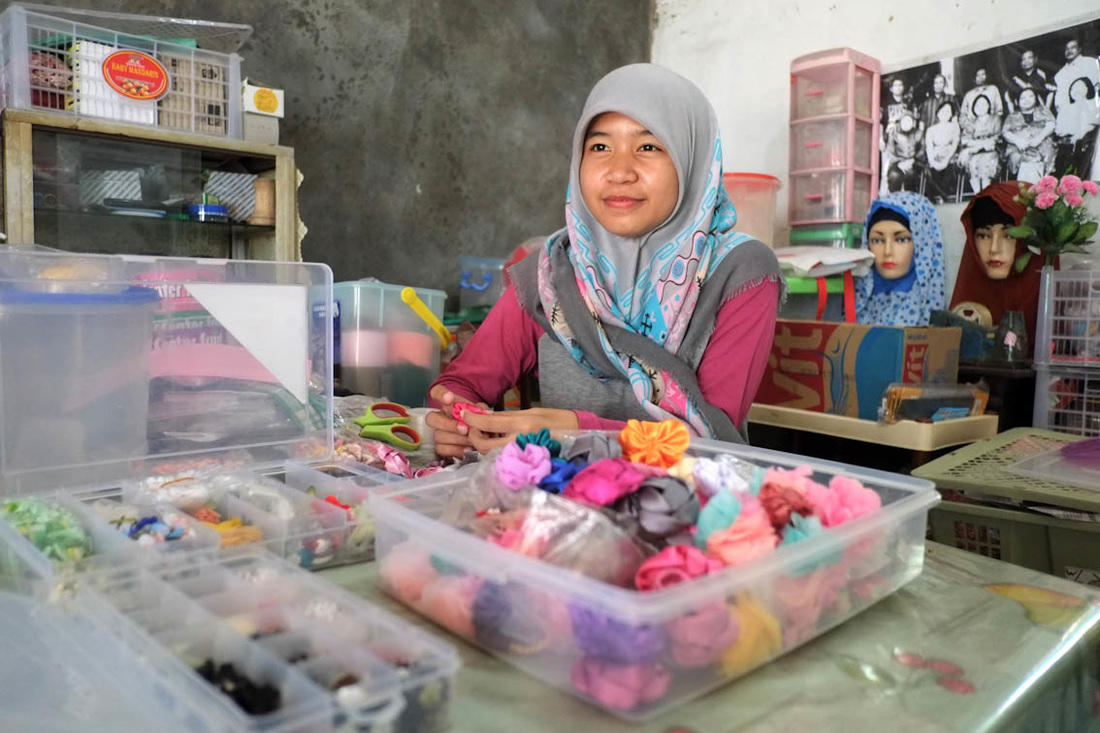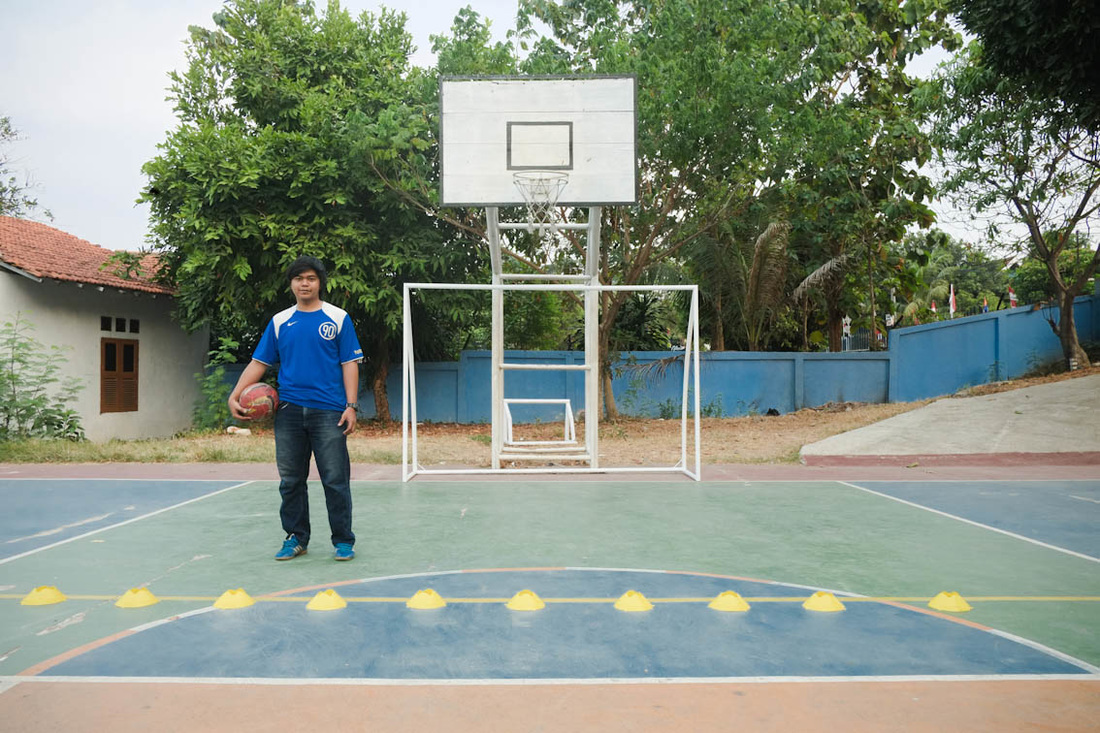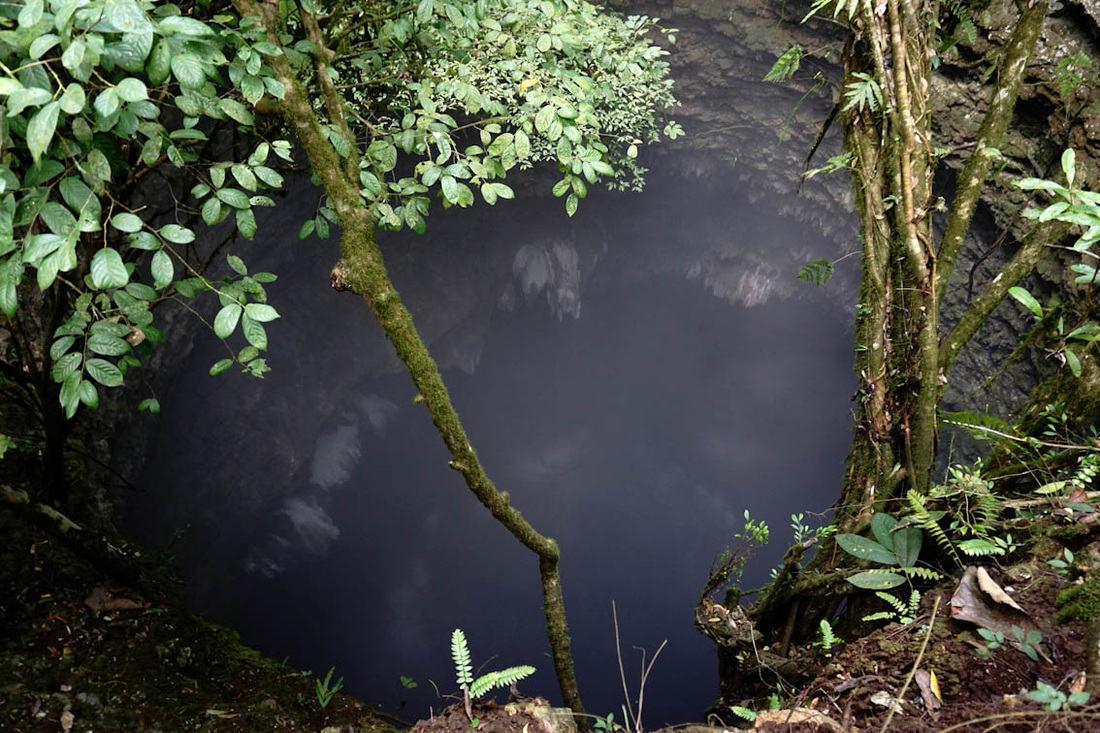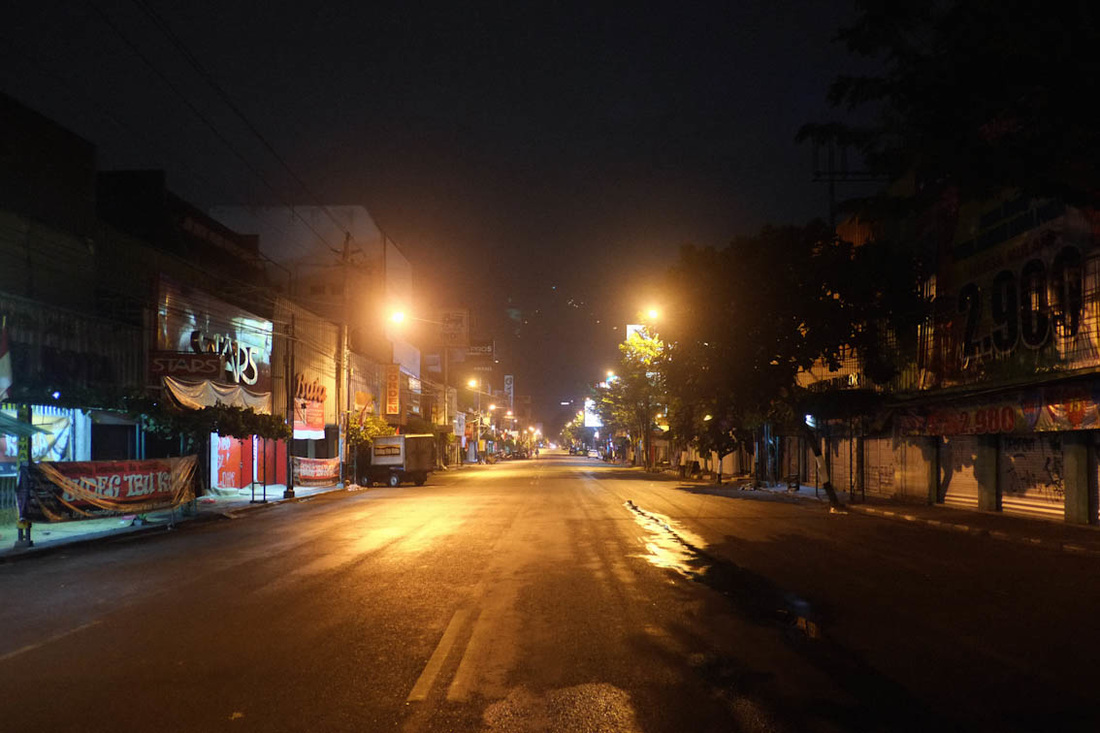Brantas River
The hotel room felt too small, too dark and too constricting for me. I walked outside, up to the river Brantas.
What scenery! Mountains, hills, a huge wide river!
I walked along its banks and, in front of the house where my sister-in-law had lived during the events of 1965, I stopped. I tried to imagine what she must have witnessed that year and the next. While afraid for the lives of her husband and her children (and, of course, for herself also), she must have seen this river coloured with blood, the blood of innocent people. Sacrificed for what? Dead bodies tied together with bamboo, like rafts, floating down there in the river. The water of the Brantas river carried the tragedy down to Surabaya where it meets the Java Sea.
I can imagine how she could not stand the view and the fear. It left her with an illness she will carry for the rest of her life. Fear reigns her, fear for her husband, for her children, even fear for her unborn grandchildren. She will never acknowledge that she is my sister-in-law to anyone outside the family. She cannot, for danger is everywhere. The river Brantas polluted her, as it did to countless others.
For a while I close my eyes. Then I look over the river again and it calms me. There are no dead bodies at the moment. There’s just a river in the midst of beautiful scenery. One day this river will produce flowers, red and white flowers, and there will be as many of them as there were dead bodies dragged away by the stream of the Java Sea. Children will bathe in it and decorate themselves with the red and white flowers and whisper to each other “it’s gone, the tragedy. Truth has blossomed. Just look at the flowers! Sang Merah Putih, the Indonesian flag, is ours!”
Goodbye Indonesia, I send you my hope, my tears and my love.
Ruth Havelaar
#1965setiaphari #living1965
An excerpt from a story published in Quartering. A story of a marriage in Indonesia during the Eighties. Clayton: Monash Papers on Southeast Asia no. 24, 1991.
On September Thirty
a letter to my granddaughter setia
1
september thirty
people still talk
people still ask
as if just a story
about horror and tragedy
what and what
who and who
why and why
in this not knowing
everyone talks, still fighting the truth
history and stories become one
washed away in foam
angels of death laugh and celebrate
amidst the moans of life being destroyed
2
in the midst of those who struggle
piles of dirt are dug up
piles of stories are opened up
in the name of history,
straightened
a victory over the weak
a victory over those who lost
all in the name of history
3
in the midst of horror and tragedy
i, your grandfather, want to return
back to myself
ash of history
as an ash of history
i follow the shadow of the sun
not just for the moon
but also to follow the mountains and forests
inevitable
i follow the flow of the wind
not just for the patter of its wings
but also with the seasons and storms
inevitable
my granddaughter,
this is the era of democracy
they say
this is the era of reform
they say
what is the meaning then
if it ends as a creed
reform, democracy
and what else
the rumbling thunder of fall
bash on the walls of power
dissolve in a daydream
these are not fables but
a sign that the heart of tyranny
is breathing
is on fire
4
on this september thirty, setia
the story is still the same
playing lies
playing humanity
the red and white flowers
still bloom
flowers of freedom
in the midst of struggle
white doves
still spread their wings
wings of peace
against a dry sky
blue heaven
heaven of hope
humanity
is still beating
even very softly
5
setia, my granddaughter
this month is the month of your birth
also the month when your opa
became ash
ash of history
forever
Hersri Setiawan
Translated into English by Ken Setiawan, 30 September 2015
#living1965 #1965setiaphari
What is in the past has not passed
The end of time, ceasing on the thirtieth
Rotten plans meeting the good
Not speaking, not knowing one another
World police observe and prepare themselves
Politicians prowl, between hope and fear
High-ranking army officials scurry, their faces ready to leave
Weapons, equipment and civilians await the order
Reformers continue on, as in days past
Fifty years ago
Since then September has always been sombre
Forced loss, weapons became masters, capital became God
Ordinary people lost hope
Endless wounded memories
Lost even when not defeated
Then comes October
Army newspapers blame women
Destroyers of morality, offending a sacred society
Hundreds of thousands of souls lost
Maybe millions
Who cares
The people ran amuck, they said
How did they know who to target?
Many deaths, varied types of torture
What kind of menu, do you need and what side dish?
Fifty years ago
After that, October was never the same
Military became victors
Communists sinners
Failed women enemies of the nation
Obedient women pillars of the state
Most of the people work too much
The triumphant capital of prosperous families
Death and more death, continues uninvited
It’s not as if there wasn’t resistance
But to live a good life is indeed hard
Many stubborn people, many frauds, the masses play
For hope
Morality eroded by capital
Bravery cannot appease the necessities of life
Even so, unsure how, names keep
Emerging
The sun still shines, even if its rays cannot reach far and wide
If September was a preparation
for the death of October,
then the other ten months are a struggle
for existence.
Zely Ariane
Translated to English by Edwina Brennan
#1965setiaphari #living1965
Kill Us If You Can
I wish my grandmother hadn’t passed away in 2009. I would ask her again, and again, to explain her reason to stay. You could’ve left the country, I said – I would have. No, she said, in her own words, limited by pain: if I had left, they would’ve thought they were right, that we did wrong. She said no more, no less, and knowing her, she was right. She was always right.
She was right to send all her younger children away from her in chaos while she rebuilt everything. She was right to go back, no matter how mortifying, to the exact same spot her husband was taken away from her, exactly the same spot their house was burned to death, exactly the same spot she gave life to all her children except for her eldest, my father. The same spot she said, proudly, in her wordless persistence: I am here, and we are still alive. Kill me if you can.
Kill me, if you can, the same way you killed my husband. Kill me, if you can, the same way you killed my husband, in any way you told me you had killed my husband. Some said, with satisfaction, that he was shot under a tree, squealing like a pig. Some said, with admiration, that he was detained and tortured before he was eventually killed, and oh how good a man he was. And she kept this, the good man that he was, the grandfather I have never met, very close to her guts.
I wish my grandfather hadn’t been disappeared in 1965. I would’ve asked him, in 1998, whether 1965 was less scarring. I would’ve asked him, in 1998, why his wife called me then out of the blue, blurting out such toneless, wordless fear. I would’ve asked him why I had to grow up keeping his disappearance a secret. I would’ve asked him whether he had once agreed with Marx or Mao. I would’ve asked him why he stayed. You could’ve left the country, I would’ve said, knowing he wouldn’t have, the nationalist that he was. I would’ve asked him why we were so broken. I would’ve asked him why we kept silent. I would’ve asked him why we’re different.
But another year has passed, again, and here I am, still asking, yet another year further from the day he was disappeared. I keep going back, exactly because it is mortifying, to these same places of losses, to the same spot where my grandmother had said, with pride: I am here, and we are still alive. Kill us if you can.
And it’s not only for her do I keep him, the good man that he was, the grandfather I have never met, very close to my guts.
Tintin Wulia
#living1965 #1965setiaphari
Sarah Intan
That day, I went to my Aunt’s house to interview her. Then I went with Dayu to take his photograph. When I came back to the house, Sarah had just returned from work.
We talked about Grandfather again. Just like I did when I photographed Dayu, I told that Grandfather was a teacher at a Tamansiswa school, fought in the independence war and was active in the Peasant’s Front, in the Scouting Movement, and worked as an educator for farmers.
I asked Sarah and Dayu’s opinion about the violence, the disappearances, the killings and the discrimination that leftists experienced in 1965. Like anyone who uses logic and has empathy, they could not accept what happened. The more so as Indonesia follows the rule of law, where one should be considered innocent if the case has not been brought to court.
Knowing more about Grandfather made them feel more proud of him. They became increasingly convinced, that he had not done anything wrong.
That was the first day we talked about Grandfather. Sarah said; “I will always be proud of Mbah Boen and his ideals”.
Rangga Purbaya
#1965setiaphari #living 1965
Dayu
After the interview with Bu Niniek, I went with Dayu to a junior high school in East Jakarta. Dayu is a trainer for their soccer team. After the photo session, we talked about grandfather. I told him about grandfather’s history since the beginning of his career as a teacher in Tamansiswa, the period of war for the independence, his activity in BTI, Scouting and his job as an agrarian counsellor. Besides telling the story I also asked what he knows about grandfather. Like my other cousins, Dayu knew that grandfather was missing in 1965 but he did not know what really happened.
It was the first time we spoke about grandfather. Dayu said, “He is my pride forever, and not to be hidden and ignored.”
Rangga Purbaya
#1965setiaphari #living 1965
Starting Point
In the beginning of the reformation period just after the fall of Soeharto, my father and mother immediately joined the research team formed by the Foundation for the Research into Victims of the 1965-1966 Killings (YPKP 65). Luweng Grubug is an outcome of their investigation and research with the YPKP 65 team. Therefore, especially for my father’s generation, Luweng Grubug is an answer, an end point for their probings.
However, for me, this is not an end point at all. Luweng Grubug becomes a starting point for me, for many other questions regarding my missing grandfather’s background, and why he had to be disappeared.
Rangga Purbaya
#1965setiaphari #living1965
Right People Walk on the Left
Around the end of the seventies, Bu Niniek decided to do her uni studies in Yogyakarta. Her family members objected to her choices, but she still did it, because she had a hidden agenda.
Niniek always walked to get to school, and she would stop if she found an old man on the road. Being the youngest child of the family, she was not too familiar with her father, and was really missing him. That was why she moved to Yogyakarta with the hope to find her father there. But this never happened.
I took this photograph on Solo street, in Yogyakarta. I deliberately chose this location because Bu Niniek used to live in Kepuh, an area on Solo street close to her campus in the Accounting Academy. It so happened that when I first moved to Yogyakarta, my only friend at the time lived there. This is why I often hung out in Kepuh, and got to know that area quite well, even before I heard of Bu Niniek’s story.
When I heard that story, I could immediately imagine my aunt’s daily setting. I always hung out until morning there, where the street became so empty. This is the mood that came to my head when I heard my aunt Niniek’s story. This is why I chose to capture the moment at dawn, when the street is forlorn.
Rangga Purbaya
#1965setiaphari #living 1965
The Clan of ’65
One day this made me extremely annoyed, so I said to my father, “Father, what is wrong with you oldies – you always talk about ’65. What do you want? Isn’t life suppose to move forward, instead of being nailed in the past?” This apparently tickled my father – he laughed, “Actually, you’re right, Nita, isn’t that funny? So, you’d call us ‘The Clan of 65’, or something like that?”
My children, because they were very close to their late grandfather, definitely got all the stories about ’65 as soon as they were old enough to think and ask questions. And really, even when this quite annoyed me, I think my children are quite lucky. It is natural for us as human to look for our roots – just look at an adopted child, who would usually try to find their origin the moment they know they were adopted. I can’t deny that ’65 is part of our life, and part of my children’s late grandfather’s life.
I think these stories must go on, because these stories are our roots.
Anita Sobron
#living1965 #1965setiaphari
Why Fear
My grandma, who had lost her husband – when I asked her why she didn’t just leave the country, why against all odds she returned exactly to the place where her house was flattened to the ground, to rebuild everything, said the same thing: if I had left and never returned, people would think I had indeed done something wrong. I am not afraid, because I had done nothing wrong, she said.
Sometimes I feel quite angry thinking about this – because of this stupid principle, they didn’t only sacrifice themselves, but also all their family and their descendants. There are times though when I feel quite proud, although sometimes I think feeling proud of this is actually quite naive. What I know for sure is that even when their persistence edges on stubbornness, they’re good people – and I want to be like them.
Tintin Wulia
#living1965 #1965setiaphari



